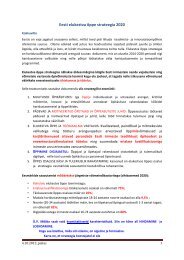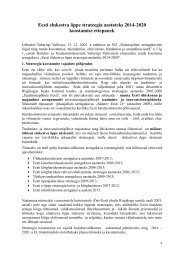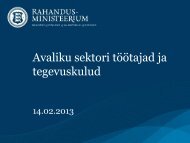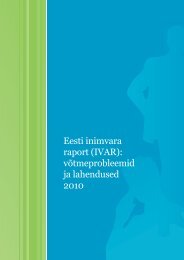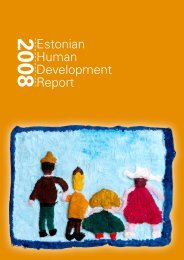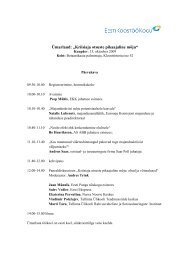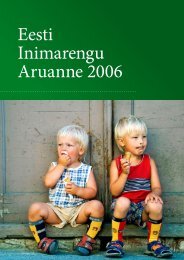DEVELOPMENT
The pdf-version - Eesti Koostöö Kogu
The pdf-version - Eesti Koostöö Kogu
You also want an ePaper? Increase the reach of your titles
YUMPU automatically turns print PDFs into web optimized ePapers that Google loves.
Summary<br />
Erik Terk<br />
Estonia is part of the world’s most globalised region –<br />
the European Union – and is also quite globalised as<br />
a state, especially in regard to the economy. A strong<br />
dependencev an international economic environment<br />
contains great opportunities for economic gowth, but<br />
also significant risks. In order to make use of the opportunities<br />
provided by globalisation and to reduce the risks<br />
involved, more consistent efforts and proactive behaviour<br />
are required on the part of our economic policy, incl. foreign<br />
trade policy.<br />
The Estonian elite clearly stand out for their globalisation-minded<br />
and pro-EU attitudes. The latest economic<br />
crisis has not weakened these attitudes. The attitudes of<br />
the various elite groups do no differ significantly when it<br />
comes to these issues. In principle, the attitudes of Estonia’s<br />
general public are also the same.<br />
There is a clear expectation among the Estonian<br />
elite about the need to move towards more focused<br />
policies along with an understanding that the role of<br />
the state, as the initiator, should be stronger in several<br />
spheres of activity.<br />
Despite similar expectations related to the need to<br />
continue economic openness, and to improve the focus of<br />
our policies, the positions of the various elite groups are<br />
quite diffused when it comes to what should be focused<br />
on, what should be prioritised and in which spheres<br />
of activity the role of the state should be strengthened.<br />
One could wonder whether the elite’s basic preferences<br />
and expectations related to development, are sufficiently<br />
reinforced by measures necessary for their realisation.<br />
For instance, an increase of economic competitiveness is<br />
almost unanimously expected, while the same cannot be<br />
said about the increase of innovativeness or improvements<br />
in human capital, which should serve as basis for greater<br />
competitiveness. This alludes to the need to develop forms<br />
of activity that will provide a framework for enabling the<br />
various elite groups (politicians, top officials, economic<br />
elite, scholars and others) to horizontally discuss and<br />
resolve their positions. A good example are the SITRA<br />
seminars in Finland that have been organised for complex<br />
groups for a long time, enabling the participants to<br />
learn from the best foreign development experience, and<br />
to discuss how to implement them in Finland. Although<br />
we too have searched (especially under the leadership of<br />
the Estonian Development Fund) for ways to best help<br />
new growth areas to develop in the economy, no clear<br />
common positions on these issues have been formulated,<br />
and the corresponding changes in economic policy have<br />
not been undertaken.<br />
One central issue is likely to concern, in the tough<br />
competition of the globalising economy, the combining<br />
of the striving for efficiency with the need for sustainable<br />
use of social resources while maintaining the cohesion<br />
of the society, which is particularly important for a small<br />
country (income policy, social security, regional policy<br />
etc). It seems, that the political discussion concerning<br />
these issues will intensify in near future. The elite survey<br />
showed that, fortunately, the attitudes valuing economic<br />
openness do not rigidly oppose the social attitudes that<br />
perceive income differentiations as a problem. This creates<br />
the preconditions for overcoming the conflicts caused by<br />
the differences related to economic and social policies.<br />
Foreign policy is faced with the task of helping to<br />
develop and implement a multi-directional foreign trade<br />
policy (incl. neighbouring EU regions, more distant EU<br />
regions, Russia, China and South-East Asia). Also, considering<br />
the attitudes of the decision-makers that participated<br />
in the survey, there is very strong support for the<br />
implementation of mechanisms for more open and democratic<br />
policymaking. This process will not be easy, but<br />
it may provide the opportunity to find new development<br />
impetuses and opportunities.<br />
Estonian Human Development Report 2012/2013<br />
207



